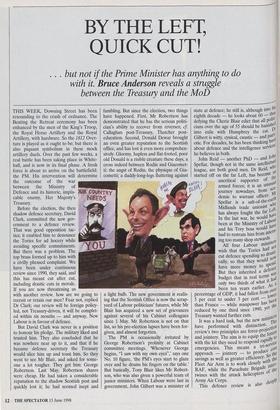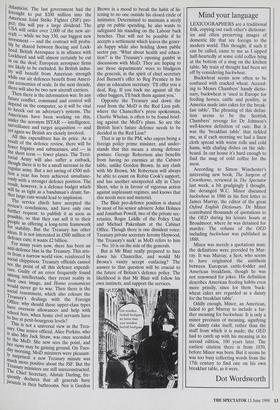BY THE LEFT, QUICK CUT!
. . but not if the Prime Minister has anything to do
THIS WEEK, Downing Street has been resounding to the crash of ordnance. The Beating the Retreat ceremony has been enhanced by the men of the King's Troop, the Royal Horse Artillery and the Royal Artillery, with hardware. So the 1812 Over- ture is played as it ought to be; but there is also piquant symbolism in these mock artillery duels. Over the past few weeks, a real battle has been taking place in White- hall, and is now in its final phase. A fresh force is about to arrive on the battlefield: the PM. His intervention will determine the outcome of the war between the Ministry of Defence and its historic, impla- cable enemy, Her Majesty's Treasury.
Before the election, the then shadow defence secretary, David Clark, committed the new gov- ernment to a defence review. That was good opposition tac- tics; it enabled him to denounce the Tories for ad hocery while avoiding specific commitments. But there was a problem. The top brass formed up to him with a civilly phrased complaint. We have been under continuous review since 1990, they said, and this has meant cut after cut, including drastic cuts in morale. If you are now threatening us with another review, how are we going to recruit or retain our men? Fear not, replied Dr Clark; our review will be foreign policy- led, not Treasury-driven, it will be complet- ed within six months — and anyway, New Labour is in favour of defence.
But David Clark was never in a position to honour his pledge. The military liked and trusted him. They also concluded that he was nowhere near up to it, and that if he became defence secretary the Treasury would slice him up and toast him. So they went to see Mr Blair, and asked for some- one a lot tougher. They got him: George Robertson. Last May, Robertson shares were cheap. He had taken a considerable reputation to the shadow Scottish post and quickly lost it; he had seemed inept and fumbling. But since the election, two things have happened. First, Mr Robertson has demonstrated that he has the serious politi- cian's ability to recover from reverses; cf. Callaghan post-Treasury, Thatcher post- education. Second, Donald Dewar brought an even greater reputation to the Scottish office, and has lost it even more comprehen- sively. Gloomy, hapless and flat-footed, poor old Donald is a risible creature these days, a cross indeed between Rodin and Giacomet- ti: the angst of Rodin, the physique of Gia- cometti; a daddy-long-legs fluttering against a light bulb. The new government is realis- ing that the Scottish Office is now the scrap- yard of Labour politicians' futures, while Mr Blair has acquired a new set of grievances against several of his Cabinet colleagues since 1 May. Mr Robertson is not on that list, so his pre-election lapses have been for- given, and almost forgotten.
The PM is occasionally irritated by George Robertson's prolixity at Cabinet committee meetings. 'Whenever George begins, "I saw with my own eyes",' says one No. 10 figure, `the PM's eyes start to glaze over and he drums his fingers on the table.' But basically, Tony Blair likes Mr Robert- son, who was also given a powerful team of junior ministers. When Labour were last in government, John Gilbert was a minister of state at defence; he still is, although into lliS eighth decade — he looks about 60 — t11115 defying the Cherie Blair edict that all polib- cians over the age of 55 should be banished into exile with Humphrey the cat. _Pr Gilbert is witty, cynical, caustic — and pain ; otic. For decades, he has been thinking bar" about defence and the intelligence services; he believes in both. John Reid — another PhD — and J0111; Spellar, though not in the same intellectual league, are both good men. Dr Reid, who started off on the far Left, has become all _„., . uncritical supporter of 111,,,e armed forces; it is an unusual journey nowadays, from a„cd.. . demic to warrant officer. .5":, Spellar is a salt-of-the-ear' Midlands trade unionist who has always fought the far Left' In the last war, he would have been at the Ministry of Lab°" and his Tory boss would havc had to restrain him from intern- ing too many shop stewards. All four Labour ministers wish that the Tories had not cut defence spending so draa11.", tally, so that they would 00:. have more money to spell' But they inherited a deferief. budget that in real terms wa, only two thirds of what it has been tenyears earlier. As percentage of GDP, it had fallen from 0ver 5 per cent to under 3 per cent — to ea than France — while manpower has be reduced by one third since 1990, yet w Treasury wanted further cuts. It was a hard task, but the new mbds1: have performed with distinction.". review's two principles are force-project-1°es and jointery. The aim is to equip the foreto with the kit they need to respond ralidlY.ce emergencies. This means a tri-servlst approach — jointery — to produce To savings as well as greater efficiency. $° the Fleet Air Arm is to work closely with RAF, while the Parachute Brigade ter' twines with the attack helicopters of Army Air Corps. de • etolY This defence review is also Atlanticist. The last government had the foresight to put $200 million into the American Joint Strike Fighter (JSF) pro- ject; this will pay a large dividend. The USA will order over 2,000 of the new air- craft — while we buy 330, our biggest new investment — and the contract will proba- bly be shared between Boeing and Lock- heed. British Aerospace is in alliance with ckheed and will almost certainly be cut in on the deal; European aerospace. firms are likely to be excluded. So British Indus- tlY will benefit from American strength while our air defences benefit from Amen- can economies of scale. In the next decade, there will also be two new aircraft carriers. Then there is the information war. In any future conflict, command and control will depend on the computer, so it will be vital to knock out an adversary's systems. The Americans have been working on this, under the acronym ISTAR — intelligence, surveillance and target acquisition — and Yet again we British are closely involved. All this expenditure has its price. As a result of the defence review, there will be fewer frigates and submarines, and — in the. short term — fewer planes. The Tern- tonal Army will also suffer a cutback, though there is to be a small increase in the regular army. But a net saving of £500 mil- lion a year has been achieved simultane- ously with a stronger defence position. The result, however, is a defence budget which will be as tight as a bandsman's drum; fur- ther large cuts would lead to implosion. The service chiefs have accepted the review's conclusions, and have only one further request: to publish it as soon as Possible, so that they can sell it to their People as offering a long-term framework for stability. But the Treasury has other ideas. It is not interested in £500 million of defence cuts; it wants £2 billion. For many years now, there has been an anti-defence bias in the Treasury. This aris- es from a narrow world view, reinforced by social chippiness. Treasury officials cannot see the point of all this defence expendi- ture. Guilty of an error frequently found among intellectuals, they recast reality in their own image, and Homo economicus would never go to war. Then there is the social resentment, which also colours the Treasurys dealings with the Foreign Office: why should these upper-class types have overseas allowances and help with school fees, when home civil servants have to live at petit-bourgeois levels? This is not a universal view in the Trea- aTrea- suryOne senior official, Alice Perkins, who is also Mrs Jack Straw, was once seconded to her the MoD. She now sees the point, and views may be gaining ground. On Tues- day morning, MoD ministers were pleasant- 15' surprised: a new Treasury minute was Treasury, more positive about the JSF. But the ministers are still unreconstructed. The Chief Secretary, Alistair Darling, fre- quently declares that all generals have Jacuzzis in their bathrooms. Nor is Gordon Brown in a mood to break the habit of lis- tening to no one outside his closed circle of intimates. Determined to maintain a steely grip on public spending, he also wants to safeguard his standing on the Labour back benches. That will not be possible if he accepts a settlement which leaves the gener- als happy while also holding down public sector pay. 'What about health and educa- tion?' is the Treasury's opening gambit in discussions with MoD. They are hoping to use those departments' woes to bludgeon the generals, in the spirit of chief secretary Joel Barnett's offer to Reg Prentice in his days as education secretary: 'I'll offer you a deal, Reg. If you back me against all the other buggers, back them against you.'
Opposite the Treasury and down the road from the MoD is the Red Lion pub, where the Chancellor's press spokesman, Charlie Whelan, is often to be found brief- ing against the MoD's plans. So are the British lion's future defence needs to be decided in the Red Lion?
That is up to the PM, who enjoys being a foreign policy prime minister, and under- stands that this means a strong defence posture. George Robertson also benefits from having no enemies at the Cabinet table, unlike Gordon Brown. In any clash with Mr Brown, Mr Robertson will always be able to count on Robin Cook's support, and has another unexpected ally in Clare Short, who is in favour of vigorous action against unpleasant regimes, and knows that this needs men and materiel.
The Blair pro-defence position is shared by most of his senior advisers: John Holmes and Jonathan Powell, two of the private sec- retaries, Roger Liddle of the Policy Unit and Michael Pakenham at the Cabinet Office. Though there is one dissident voice: Treasury private secretary Jeremy Heywood, `the Treasury's nark' as MoD refers to him — No. 10 is on the side of the generals.
But is Mr Blair really prepared to face down his Chancellor, and would Mr Brown's vanity accept outfacing? The answer to that question will be crucial to the future of Britain's defence policy. The likelihood is that Mr Blair will follow his own instincts, and support the services.



































































 Previous page
Previous page